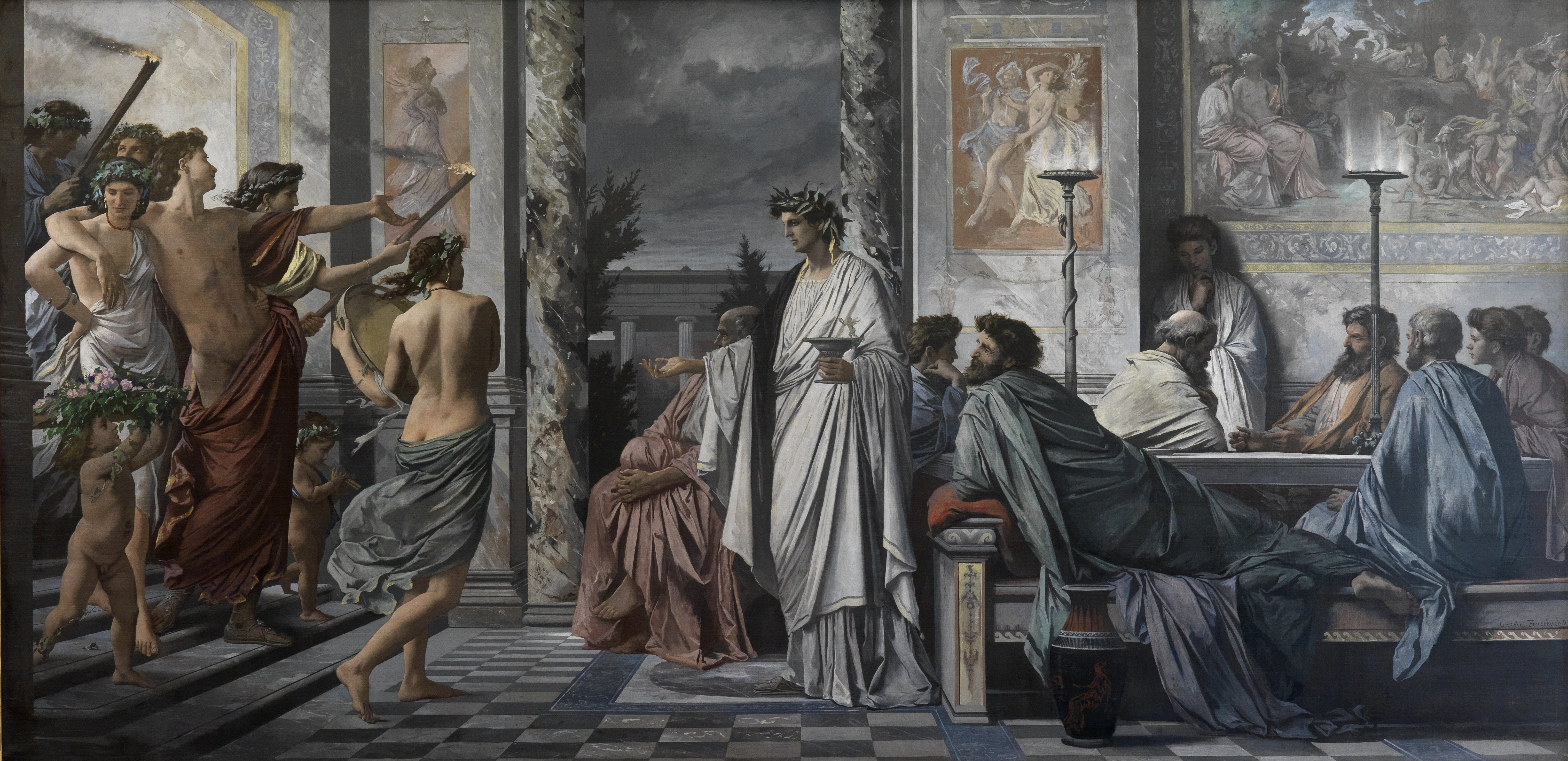|
Uranism
Uranian (from the Ancient Greek Aphrodite Urania (, )) is a historical term for homosexual men. The word was also used as an adjective in association with male homosexuality or inter-male attraction regardless of sexual orientation. An early use of the term appears in Friedrich Schiller's 'Sixth Letter' in the '' Aesthetic Education of Man'' (1795–96). Schiller claims that state institutions are so jealous they would rather share their servants with a Cytherean Venus than a Uranian Venus.Friedrich Schiller. 'Letters on the Aesthetic Education of Man.' In Harrison, Wood and Gaiger eds. ''Art in Theory 1648-1815: An Anthology of Changing Ideas''. Malden, Mass.: Blackwell, 2000. p. 800. The term was used by activist Karl Heinrich Ulrichs in a series of five booklets from 1864 to 1865 collected under the title (''The Riddle of Man–Manly Love''). The term ''uranian'' was adopted by English-language advocates of homosexual emancipation in the Victorian era, such as Edward C ... [...More Info...] [...Related Items...] OR: [Wikipedia] [Google] [Baidu] |
Ancient Greek
Ancient Greek includes the forms of the Greek language used in ancient Greece and the ancient world from around 1500 BC to 300 BC. It is often roughly divided into the following periods: Mycenaean Greek (), Dark Ages (), the Archaic period (), and the Classical period (). Ancient Greek was the language of Homer and of fifth-century Athenian historians, playwrights, and philosophers. It has contributed many words to English vocabulary and has been a standard subject of study in educational institutions of the Western world since the Renaissance. This article primarily contains information about the Epic and Classical periods of the language. From the Hellenistic period (), Ancient Greek was followed by Koine Greek, which is regarded as a separate historical stage, although its earliest form closely resembles Attic Greek and its latest form approaches Medieval Greek. There were several regional dialects of Ancient Greek, of which Attic Greek developed into Koine. Dia ... [...More Info...] [...Related Items...] OR: [Wikipedia] [Google] [Baidu] |
Classics
Classics or classical studies is the study of classical antiquity. In the Western world, classics traditionally refers to the study of Classical Greek and Roman literature and their related original languages, Ancient Greek and Latin. Classics also includes Greco-Roman philosophy, history, archaeology, anthropology, art, mythology and society as secondary subjects. In Western civilization, the study of the Greek and Roman classics was traditionally considered to be the foundation of the humanities, and has, therefore, traditionally been the cornerstone of a typical elite European education. Etymology The word ''classics'' is derived from the Latin adjective '' classicus'', meaning "belonging to the highest class of citizens." The word was originally used to describe the members of the Patricians, the highest class in ancient Rome. By the 2nd century AD the word was used in literary criticism to describe writers of the highest quality. For example, Aulus Gellius, in his ''Att ... [...More Info...] [...Related Items...] OR: [Wikipedia] [Google] [Baidu] |
Masaryk University
Masaryk University (MU) ( cs, Masarykova univerzita; la, Universitas Masarykiana Brunensis) is the second largest university in the Czech Republic, a member of the Compostela Group and the Utrecht Network. Founded in 1919 in Brno as the second Czech university (after Charles University established in 1348 and Palacký University existent in 1573–1860), it now consists of ten faculties and 35,115 students. It is named after Tomáš Garrigue Masaryk, the first president of an independent Czechoslovakia as well as the leader of the movement for a second Czech university. In 1960 the university was renamed ''Jan Evangelista Purkyně University'' after Jan Evangelista Purkyně, a Czech biologist. In 1990, following the Velvet Revolution it regained its original name. Since 1922, over 171,000 students have graduated from the university. History Masaryk University was founded on 28 January 1919 with four faculties: Law, Medicine, Science, and Arts. Tomáš Garrigue Masaryk, pro ... [...More Info...] [...Related Items...] OR: [Wikipedia] [Google] [Baidu] |
Dione (mythology)
Dione (; grc, Διώνη, Diṓnē, She-Zeus or δῖος ''dîos'' means 'divine one') is the name of four women in ancient Greek mythology, and one in the Phoenician religion described by Sanchuniathon. ''Dione'' is translated as "Goddess", and given the same etymological derivation as the names ''Zeus'', '' Diana'', et al. Very little information exists about these nymphs or goddesses, although at least one is described as beautiful and is sometimes associated with water or the sea. Perhaps this same one was worshiped as a mother goddess who presided over the oracle at Dodona, Greece and was called the mother of Aphrodite. One Dione is identified as the mother of the Roman goddess of love, Venus, or equivalently as the mother of the Greek goddess of love, Aphrodite; but Dione is also sometimes identified with Aphrodite. Titaness/Oceanid Dione is among the Titanides or Titanesses. She is called a daughter of Oceanus and Tethys, hence an Oceanid, a water-nymph. She is otherwise ... [...More Info...] [...Related Items...] OR: [Wikipedia] [Google] [Baidu] |
Zeus
Zeus or , , ; grc, Δῐός, ''Diós'', label=Genitive case, genitive Aeolic Greek, Boeotian Aeolic and Doric Greek#Laconian, Laconian grc-dor, Δεύς, Deús ; grc, Δέος, ''Déos'', label=Genitive case, genitive el, Δίας, ''Días'' () is the sky father, sky and thunder god in ancient Greek religion, who rules as king of the gods on Mount Olympus. His name is cognate with the first element of his ancient Roman religion, Roman interpretatio graeca, equivalent Jupiter (mythology), Jupiter.''Larousse Desk Reference Encyclopedia'', The Book People, Haydock, 1995, p. 215. His mythology and powers are similar, though not identical, to those of Indo-European deities such as Jupiter, Perkūnas, Perun, Indra, Dyaus, and Zojz (deity), Zojz. Entry: "Dyaus" Zeus is the child of Cronus and Rhea (mythology), Rhea, the youngest of his siblings to be born, though sometimes reckoned the eldest as the others required disgorging from Cronus's stomach. In most traditions, he is m ... [...More Info...] [...Related Items...] OR: [Wikipedia] [Google] [Baidu] |
Uranus (mythology)
In Greek mythology, Uranus ( ), sometimes written Ouranos ( grc, Οὐρανός, , sky, ), is the personification of the sky and one of the Greek primordial deities. According to Hesiod, Uranus was the son and husband of Gaia (Earth), with whom he fathered the first generation of Titans. However, no cult addressed directly to Uranus survived into Classical times, and Uranus does not appear among the usual themes of Greek painted pottery. Elemental Earth, Sky, and Styx might be joined, however, in solemn invocation in Homeric epic. Uranus is associated with the Roman god Caelus and the Jewish god Yahweh. Etymology Most linguists trace the etymology of the name to a Proto-Greek form ''*Worsanós'' (), enlarged from *''ṷorsó-'' (also found in Greek ''()'' 'to urinate', Sanskrit ''varṣá'' 'rain', Hittite ''ṷarša-'' 'fog, mist').Robert S. P. Beekes, ''Etymological Dictionary of Greek'', vol. 2 (Leiden: Brill, 2009), 1128–1129. The basic Indo-European root is ''* ... [...More Info...] [...Related Items...] OR: [Wikipedia] [Google] [Baidu] |
Pausanias (Athenian)
Pausanias (; grc-gre, Παυσανίας; fl. c. 420 BC) was an ancient Athenian of the deme Kerameis, who was the lover of the poet Agathon. Although Pausanias is given a significant speaking part in Plato's ''Symposium'', very little is known about him. Ancient anecdotes tend to address only his relationship with Agathon and give us no information about his personal accomplishments. Around 407 BC he removed himself from Athens to the court of the Macedonian king Archelaus. Pausanias appears briefly in two other Socratic dialogues, Plato's ''Protagoras'' and Xenophon's ''Symposium''. He is also mentioned in Book V of Athenaeus' ''Deipnosophistae'', and in Book II of Claudius Aelianus' ''Varia Historia.'' See also *List of speakers in Plato's dialogues following is a list of the speakers found in the dialogues traditionally ascribed to Plato, including extensively quoted, indirect and conjured speakers. Dialogues, as well as Platonic '' Epistles'' and ''Epigrams'', in whic ... [...More Info...] [...Related Items...] OR: [Wikipedia] [Google] [Baidu] |
Symposium (Plato)
The ''Symposium'' ( grc, Συμπόσιον, ) is a philosophical text by Plato, dated . It depicts a friendly contest of extemporaneous speeches given by a group of notable men attending a banquet. The men include the philosopher Socrates, the general and political figure Alcibiades, and the comic playwright Aristophanes. The speeches are to be given in praise of Eros, the god of love and desire. In the ''Symposium'', Eros is recognized both as erotic love and as a phenomenon capable of inspiring courage, valor, great deeds and works, and vanquishing man's natural fear of death. It is seen as transcending its earthly origins and attaining spiritual heights. This extraordinary elevation of the concept of love raises a question of whether some of the most extreme extents of meaning might be intended as humor or farce. ''Eros'' is almost always translated as "love", and the English word has its own varieties and ambiguities that provide additional challenges to the effort to under ... [...More Info...] [...Related Items...] OR: [Wikipedia] [Google] [Baidu] |
Plato
Plato ( ; grc-gre, Πλάτων ; 428/427 or 424/423 – 348/347 BC) was a Greek philosopher born in Athens during the Classical period in Ancient Greece. He founded the Platonist school of thought and the Academy, the first institution of higher learning on the European continent. Along with his teacher, Socrates, and his student, Aristotle, Plato is a central figure in the history of Ancient Greek philosophy and the Western and Middle Eastern philosophies descended from it. He has also shaped religion and spirituality. The so-called neoplatonism of his interpreter Plotinus greatly influenced both Christianity (through Church Fathers such as Augustine) and Islamic philosophy (through e.g. Al-Farabi). In modern times, Friedrich Nietzsche diagnosed Western culture as growing in the shadow of Plato (famously calling Christianity "Platonism for the masses"), while Alfred North Whitehead famously said: "the safest general characterization of the European philosophical tra ... [...More Info...] [...Related Items...] OR: [Wikipedia] [Google] [Baidu] |
Aphrodite
Aphrodite ( ; grc-gre, Ἀφροδίτη, Aphrodítē; , , ) is an ancient Greek goddess associated with love, lust, beauty, pleasure, passion, and procreation. She was syncretized with the Roman goddess . Aphrodite's major symbols include myrtles, roses, doves, sparrows, and swans. The cult of Aphrodite was largely derived from that of the Phoenician goddess Astarte, a cognate of the East Semitic goddess Ishtar, whose cult was based on the Sumerian cult of Inanna. Aphrodite's main cult centers were Cythera, Cyprus, Corinth, and Athens. Her main festival was the Aphrodisia, which was celebrated annually in midsummer. In Laconia, Aphrodite was worshipped as a warrior goddess. She was also the patron goddess of prostitutes, an association which led early scholars to propose the concept of "sacred prostitution" in Greco-Roman culture, an idea which is now generally seen as erroneous. In Hesiod's ''Theogony'', Aphrodite is born off the coast of Cythera from the foam (, ) ... [...More Info...] [...Related Items...] OR: [Wikipedia] [Google] [Baidu] |
Eros (love)
Eros (, ; ) is a concept in ancient Greek philosophy referring to sensual or passionate love, from which the term ''erotic'' is derived. ''Eros'' has also been used in philosophy and psychology in a much wider sense, almost as an equivalent to "life energy". The Protestant author C. S. Lewis posits it as one of the four ancient Greek words for love in Christianity, alongside ''storge'', ''philia'', and ''agape''. In literature The classical Greek tradition In the classical world, erotic love was generally referred to as a kind of madness or ''theia mania'' ("madness from the gods"). This love passion was described through an elaborate metaphoric and mythological schema involving "love's arrows" or "love darts", the source of which was often the personified figure of Eros (or his Latin counterpart, Cupid), or another deity (such as Rumor). At times the source of the arrows was said to be the image of the beautiful love object itself. If these arrows were to arrive at the ... [...More Info...] [...Related Items...] OR: [Wikipedia] [Google] [Baidu] |







